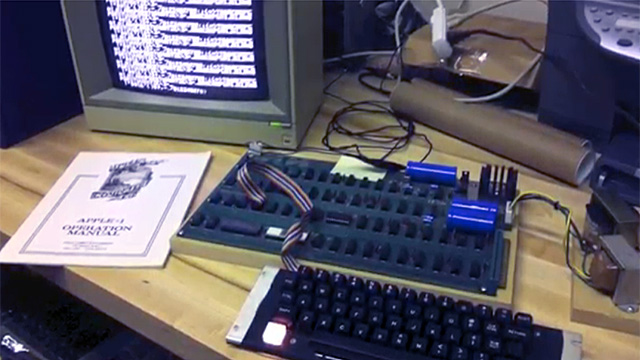
Apple may not open its own museum anytime soon, but that's not stopping enthusiasts from putting their own Apple memorabilia on display. David Greelish is one of them. Founder of the Atlanta Historical Computing Society, Greelish partnered up with local "big-time" computer collector Lonnie Mimms to put together a museum-quality exhibit based on Mimms' extensive collection—particularly when it comes to vintage Apple products—as part of the first Vintage Computer Festival Southeast.
"I've wanted to have a classic computing convention for some years, having attended the original in California, and also the VCF East in New Jersey," Greelish told Ars. After discussing the idea with the AHCS, they came upon Mimms and his collection. "He has every significant American personal computer, plus some foreign ones too. Also some classic Intel development machines, a couple of other pre-Altair computers (Altair being the first commercially successful "microcomputer), and much, much more."
But Mimms wanted to focus specifically on Apple—partly because of Steve Jobs' recent passing, but also because of Apple's "overwhelming success and stardom." And so the two teamed together to create the Apple Pop-Up Museum, which will be part of the Vintage Computer Festival Southeast 1.0 when it opens in Atlanta on April 20 and 21, 2013. In a twist of historical fate, the show will be held in an old CompUSA store, with 6,000 feet of the CompUSA regional corporate offices being used for the Apple Pop-Up museum. "[Mimms] and his staff are literally building a museum within the separate rooms," Greelish told Ars.
Why Atlanta? Greelish says it's simply because he and the other ACHS members are already based there. He pointed out that the exhibit is not in Cupertino—or even California—though the reason for that is more due to Apple's apparent disinterest in being involved in such a museum directly. Indeed, in late 2011, Stanford's Silicon Valley Archive revealed that Apple itself had originally wanted to open its own history museum, but the project got killed when Steve Jobs returned to the company in 1997. "Apple is well-known for never looking back," Greelish said.
That said, there is a small selection of early Apple documentation available to the public, at the Computer History Museum in Mountain View, California. The collection includes the Preliminary Macintosh Business Plan from 1981, details about executives, and more. But because of the limited access to historical Apple items, Greelish says he's open to the possibility of taking the exhibit on the road.
"It could be used in his own museum one day, or tour on its own, or even be loaned out to other museums," he told Ars. "People will walk away understanding the overall story much better, and appreciating Apple's huge impact on our personal computing experiences, communications, and entertainment methods. It's a great start for an excellent collection to be seen and enjoyed. The same exhibit principles can then be used on other 'themes' in Lonnie Mimms' collection."
So what are some of the headline items that will be showcased in the pop-up museum? Greelish says his favorites are the original Apple I and the Xerox Alto, which he considers to be the two devices that set the personal computing revolution in motion. But there will be plenty of other vintage items for visitors to check out—some of which the general public may have never even seen before in real life, such as the Apple II, the original Lisa, and even black NeXT computers. There will even be other Apple memorabilia items on display, like various 'Think Different' posters and plenty of old Apple photographs.
In preparation for the event, Greelish gave us early access to a 26-minute video interview he conducted with Mimms about his collection:
"The items, artifacts, pictures, movies, and audio are all very important to telling the story of Apple, but I think the single most important aspect to this 'pop-up museum' will be attendees' 'aha' moment when they realize just how significant the cultural impact has been for Apple," Greelish said. "The company's products and designs have impacted most of our lives. Many people are also not aware of how long the company has been around, or the very interesting story of its beginning, the range of its other and historical products, or even the richer past of Steve Jobs, before the iPhone."
Of course, the Vintage Computer Festival Southeast will be more than just the Apple Pop-Up Museum. Greelish described it as a car show for classic computing, with exhibitors offering retro gaming displays, an original Altair, an old-school computer building workshop, and even instructional presentations like an introduction to soldering. There will also be numerous speakers giving talks on a huge variety of vintage computing topics for all ages.
"The history of the personal computer precedes even Apple's contributions," Greelish said. Still, he hopes visitors will stop by the Apple exhibit regardless of their own computing habits. "People will walk away understanding the overall story much better, and appreciating Apple's huge impact on our personal computing experiences, communications, and entertainment methods."
reader comments
23